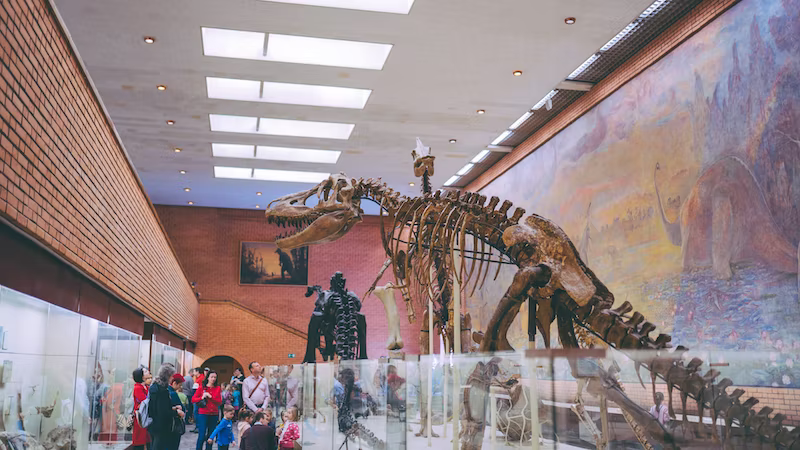Ever wonder what those giant dinosaur skeletons in museums are all about? Have you been fascinated by fossils since you were a kid, digging in the dirt and pretending to be a paleontologist? Well, if dinosaurs and prehistoric creatures spark your curiosity more than anything else, then maybe paleontology is your calling!
Paleontology is like detective work for the past, where you get to unearth the mysteries of ancient life by studying fossils. It’s pretty amazing to think that you can hold a piece of history in your hand and learn about the creatures that roamed the Earth millions of years ago.
But if you’re serious about becoming a paleontologist, choosing the right college is an important first step. We’ll explore the 20 best colleges for paleontology in 2024, from universities with world-renowned paleontology programs to hidden gem schools with amazing research opportunities.
Table of contents
- What is Paleontology?
- What Do Palenteologists Do?
- How Long Does It Take to Study Paleontology?
- Colleges for Paleontologists
- 1. University of California, Berkeley:
- 2. Harvard University:
- 3. University of Michigan, Ann Arbor:
- 4. Yale University:
- 5. University of Chicago:
- 6. University of California, Los Angeles (UCLA):
- 7. University of Texas at Austin:
- 8. University of Oxford:
- 9. University of Cambridge:
- 10. University of Colorado Boulder:
- 11. University of California, Riverside:
- 12. University of Kansas:
- 13. University of Bristol:
- 14. University of Montana:
- 15. University of Alberta:
- 16. University of Edinburgh:
- 17. University of Bristol:
- 18. University of Wyoming:
- 19. University of Munich:
- 20. University of New South Wales:
- FAQs – Colleges for Paleontology
- Conclusion
- References
- Recommendations
What is Paleontology?
Paleontology is the scientific discipline that focuses on the study of ancient life and the history of Earth’s past. It explores the fascinating world of fossils, seeking to understand and reconstruct the diversity of prehistoric organisms, their behavior, and the environments in which they lived.
Paleontologists analyze and interpret the remains of plants, animals, and even microscopic organisms preserved in rocks, sediment, or ice, providing crucial insights into the evolution of life on our planet.
Through meticulous excavation, laboratory analysis, and interdisciplinary research, paleontologists unlock the secrets of the past, shedding light on Earth’s geological history, the emergence of new species, and the complex interactions between organisms and their changing environments.
This dynamic field bridges geology, biology, and anthropology, offering a window into ancient worlds and deepening our understanding of life’s remarkable journey.
Read: 15 Best Colleges with Physical Education Majors in 2024
What Do Palenteologists Do?
Paleontologists engage in various activities to explore and understand ancient life. Their work involves conducting field expeditions to discover and excavate fossils from various geological formations. This includes carefully documenting the location, context, and characteristics of the specimens they find.
In the laboratory, paleontologists employ techniques such as fossil preparation, imaging, and analysis to study the recovered specimens in detail. They may use microscopes, CT scans, and other tools to examine the structures and features of fossils.
Paleontologists also play an important role in classifying and identifying fossils, determining their age and evolutionary relationships. They analyze fossil records to reconstruct past ecosystems, deciphering the interactions between organisms and their environments.
Additionally, paleontologists may engage in cutting-edge research, using molecular biology, isotopic analysis, and other innovative methods to gain insights into ancient life forms.
In all, paleontologists contribute to our understanding of Earth’s history, the evolution of life, and the impacts of environmental changes over time.
How Long Does It Take to Study Paleontology?
The duration of studying paleontology can vary depending on the level of education and specialization pursued. A bachelor’s degree in paleontology typically takes around four years, including foundational coursework in geology, biology, and paleontological principles.
For those aspiring to higher levels of expertise, a master’s program typically requires two additional years of study, while a Ph.D. program can take four to six years.
These advanced degrees often involve conducting original research and may include teaching or fieldwork components. So, the length of study in paleontology depends on the desired level of specialization and the individual’s academic path.
Also, read: 10 Best Animal Behavior and Ethology Colleges in 2024
Colleges for Paleontologists
Here are the 20 best colleges for paleontologists:
- University of California, Berkeley:
- Harvard University:
- University of Michigan, Ann Arbor:
- Yale University:
- University of Chicago:
- University of California, Los Angeles (UCLA):
- University of Texas at Austin:
- University of Oxford:
- University of Cambridge:
- University of Colorado Boulder:
- University of California, Riverside:
- University of Kansas:
- University of Bristol:
- University of Montana:
- University of Alberta:
- University of Edinburgh:
- University of Bristol:
- University of Wyoming:
- University of Munich:
- University of New South Wales
1. University of California, Berkeley:
The University of California, Berkeley, is one of the best colleges for paleontology. It offers a renowned paleontology program with access to extensive fossil collections and research opportunities.
Students benefit from collaborations with esteemed faculty members and can participate in fieldwork expeditions to various paleontological sites.
2. Harvard University:
Harvard University boasts a strong Earth and Planetary Sciences department, making it a hub for paleontological research. The university’s renowned faculty members and state-of-the-art facilities provide students with an excellent academic environment to explore the depths of paleontology.
Also, see: What is a Flagship University? Tuition Fees & Financial Aid
3. University of Michigan, Ann Arbor:
The University of Michigan, Ann Arbor, houses the Museum of Paleontology, which boasts an extensive collection of fossils. The university offers comprehensive programs in paleontology, allowing students to engage in hands-on research and gain valuable field experience.
4. Yale University:
Yale University features distinguished faculty members with expertise in paleontology and offers well-equipped research facilities for students. The institution’s commitment to interdisciplinary approaches allows students to explore the intersection of paleontology with other fields like geology and evolutionary biology.
5. University of Chicago:
The University of Chicago is another of the best Colleges for Paleontology. It offers interdisciplinary programs that combine paleontology with other scientific disciplines. Students benefit from a strong emphasis on research and can access cutting-edge facilities to conduct their studies and contribute to the field.
6. University of California, Los Angeles (UCLA):
UCLA provides opportunities for paleontological research and fieldwork in collaboration with the Los Angeles County Museum of Natural History. Students can work alongside renowned experts in the field, gaining valuable insights into studying ancient life forms.
Also, see: How Many UCAS Points Do You Need For University?
7. University of Texas at Austin:
The University of Texas at Austin is renowned for its paleontological program and offers access to the Texas Memorial Museum. Students benefit from a comprehensive curriculum and can engage in research projects focusing on the diverse fossil record of Texas and beyond.
8. University of Oxford:
The University of Oxford in the United Kingdom offers exceptional Paleobiology and Earth Sciences programs. Students can access world-class research facilities and explore paleontological studies within the Oxford University Museum of Natural History.
Read Also: Can You Apply to Both Oxford and Cambridge University?
9. University of Cambridge:
The University of Cambridge also provides excellent opportunities for paleontological research within its Department of Earth Sciences. Students benefit from a rich academic environment and can collaborate with leading experts in the field.
10. University of Colorado Boulder:
The University of Colorado Boulder is another one of the best Colleges for Paleontology. It offers paleontology programs that emphasize field experiences and research opportunities, particularly in the diverse paleontological landscapes of the Rocky Mountains. Students can engage in hands-on fieldwork and gain practical skills for their future careers.
11. University of California, Riverside:
The University of California, Riverside, offers a paleontology program that focuses on studying the rich fossil record of Southern California. Students can access the university’s research collections and participate in fieldwork expeditions to explore the region’s diverse geological formations.
12. University of Kansas:
The University of Kansas is renowned for its vertebrate paleontology program and is home to the Biodiversity Institute and Natural History Museum. Students can engage in cutting-edge research, study well-preserved fossil specimens, and benefit from collaborations with faculty members and museum experts.
Also, see: 15 Online Colleges in Kansas for International Students
13. University of Bristol:
The University of Bristol, located in the United Kingdom, offers an excellent paleontology program focusing on the evolution of life. Students can access world-class laboratories and fieldwork opportunities, including studying fossils from various geological periods.
14. University of Montana:
The University of Montana provides a paleontology program that emphasizes field experiences in the picturesque landscapes of the American West. Students can engage in research projects, conduct fossil excavations, and explore topics such as paleoecology and paleoclimatology.
15. University of Alberta:
The University of Alberta, located in Canada, offers a paleontology program that combines classroom instruction with hands-on fieldwork. Students can study fossils from diverse ecosystems and gain practical experience in fossil preparation and analysis.
16. University of Edinburgh:
The University of Edinburgh in Scotland offers an exceptional paleontology program. Students benefit from access to world-class research facilities and the renowned National Museum of Scotland, which houses extensive fossil collections. The university’s interdisciplinary approach allows students to explore paleontology within a broader context.
17. University of Bristol:
The University of Bristol’s School of Earth Sciences offers specialized programs in paleontology. Students can engage in hands-on research, take part in fieldwork expeditions, and collaborate with faculty members who are leading experts in their respective fields of study.
Also, see: 10 Best Food Science Colleges 2024 | Requirements, Cost
18. University of Wyoming:
The University of Wyoming boasts a strong paleontology program with a focus on the ancient life of the Rocky Mountain region. Students can participate in fieldwork expeditions, excavate fossils, and research diverse topics such as dinosaur paleobiology and paleoenvironments.
19. University of Munich:
The University of Munich in Germany offers an excellent paleontology program combining classroom learning and field experiences. Students have access to state-of-the-art laboratories and benefit from collaborations with leading researchers.
Also, see: 15 Best Colleges For Zoology in the World | Ranking
20. University of New South Wales:
The University of New South Wales in Australia offers a comprehensive paleontology program. Students can explore the diverse fossil record of Australia and the surrounding region while studying under faculty members actively engaged in paleontological research and discovery.
FAQs – Colleges for Paleontology
Paleontology, a scientific discipline, has a long history, dating back to the 18th century. However, humans have been intrigued by fossils and the remnants of ancient life for thousands of years. Throughout different cultures and civilizations, there have been instances of fossil discoveries and attempts to interpret their significance, contributing to the early beginnings of paleontological understanding.
Paleontologists don light-colored, breathable attire, often khaki, and a brimmed hat in the field. Many opt for a Kool Tie, a cloth tube filled with cooling gel beads worn around their necks to combat the heat in warmer climates. This practical gear helps ensure comfort and protection as they carry out their work studying ancient life.
Yes, paleontologists often engage in digging as part of their work. They excavate various sites, carefully uncovering and extracting fossil specimens from the surrounding rock or sediment. This meticulous process allows them to recover fossils for further study, analysis, and interpretation, providing valuable insights into Earth’s prehistoric lifeforms and ecosystems.
Conclusion
These 20 colleges for paleontology in 2024 offer exceptional programs, renowned faculty, and valuable research opportunities to students passionate about studying ancient life. From prestigious institutions like Harvard University and the University of California, Berkeley, to universities worldwide, each college brings unique strengths and resources to the field. Whether conducting groundbreaking research, participating in fieldwork expeditions, or studying diverse fossil collections, these institutions provide the foundation for students to embark on a fulfilling journey in paleontology and contribute to our understanding of Earth’s prehistoric past.
References
- edurank.org – Best Universities for Paleontology in the World
- collegegazette.com – The Best Paleontology Schools in the US
- usnews.com – Best Paleontology Programs
- grantford.org – Best Colleges For Paleontology



